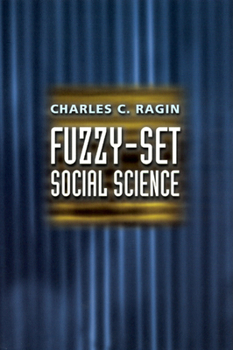Fuzzy-Set Social Science
Select Format
Select Condition 
Book Overview
In this innovative approach to the practice of social science, Charles Ragin explores the use of fuzzy sets to bridge the divide between quantitative and qualitative methods. Paradoxically, the fuzzy set is a powerful tool because it replaces an unwieldy, "fuzzy" instrument-the variable, which establishes only the positions of cases relative to each other, with a precise one-degree of membership in a well-defined set. Ragin argues that fuzzy...
Format:Paperback
Language:English
ISBN:0226702774
ISBN13:9780226702773
Release Date:August 2000
Publisher:University of Chicago Press
Length:370 Pages
Weight:1.16 lbs.
Dimensions:0.8" x 6.2" x 9.0"
Customer Reviews
2 ratings
This book is a great first step in reorienting social science
Published by Thriftbooks.com User , 17 years ago
Where to start? Well, first the second reviewer is off the mark with the critique about the specificity regarding the IMF. This is not a book about the IMF, so the lack of exhaustive it not a fatal flaw. What this book attempt to accomplish is to get one to think about new ways of categorizing social phenomena. Too much of quantitative method assumes that one can make clear distinctions between categories. This is stating the case much too strongly to reflect reality in an acceptable manner. What Ragin does is offer some theorizing about how one can recognize the fuzzy-boundaries of social phenomena. His insight rests on the use of key characteristics to provide the metric for those who will try to better reflect social events in their research. If you wish to create a better explanation of what you are studying then purchase this book. It is sure to improve your research and how you theorize about the objects you study.
useful place to start but by no means the final story
Published by Thriftbooks.com User , 23 years ago
There are two aspects to Ragin's book. The first part of the book is really an update of his general methodological program first set forth in The Comparative Method. It does add some new things to the older material and is thus worth the look. Ragin has some important points to make and deserves to be paid careful attention by social scientists of both qualitative and quantitative traditions. The second part is a relatively gentle--too gentle in my view--introduction to fuzzy set theory as well as to some applications to social scientific problems that can be addressed with FST. This is useful since it won't put readers off with lots of heavy math they're unlikely to understand. However, the presentation of FST in this book is weak. IMO the worst deficiency is that it lacks cites to more detailed literature that would be necessary for anyone who wanted to apply FST to real problems.Read this but you really need to see Michael Smithson's alas now quite rare Fuzzy Set Analysis for Behavioral and Social Sciences... which isn't cited in Ragin.






